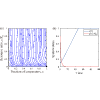Hybrid reward-punishment in feedback-evolving game for common resource governance
IF 2.4
3区 物理与天体物理
Q1 Mathematics
引用次数: 0
Abstract
How to maintain the sustainability of common resources is a persistent challenge, as overexploiters often undermine collective efforts by prioritizing personal gain. To mitigate the overexploitation of resources by violators, previous theoretical studies have revealed that the introduction of additional incentives, whether to reward rule-abiding cooperators or to punish those who overexploit, can be beneficial for the sustainability of common resources when the resource growth rate is not particularly low. However, these studies have typically considered rewarding and punishing in isolation, thus overlooking the role of their combination in common resource governance. Here, we introduce a hybrid incentive strategy based on reward and punishment within a feedback-evolving game, in which there is a complex interaction between human decision making and resource quantity. Our coevolutionary dynamics reveal that resources will be depleted entirely, even with cooperative strategies for prudent exploitation, when resource growth is slow. When the rate of resource growth is not particularly low, we find that the coupled system can generate a state where resource sustainability and cooperation can be maintained. Furthermore, when the rate of resource growth is moderate, we find that achieving this state cannot simply allocate all incentive budgets to reward. In addition, the increase in per capita incentives significantly promotes the stability of this state.

反馈演化博弈中的混合奖惩,促进共同资源治理
如何保持共同资源的可持续性是一项长期挑战,因为过度开发者往往以个人利益为先,从而破坏集体努力。为了缓解违规者对资源的过度开发,以往的理论研究表明,在资源增长率不是特别低的情况下,引入额外的激励措施,无论是奖励遵守规则的合作者,还是惩罚过度开发者,都有利于共同资源的可持续性。然而,这些研究通常孤立地考虑奖励和惩罚,从而忽视了两者结合在共同资源治理中的作用。在这里,我们引入了一种基于反馈演化博弈中奖励和惩罚的混合激励策略,在这种博弈中,人类决策和资源数量之间存在着复杂的相互作用。我们的共同进化动力学揭示出,当资源增长缓慢时,即使采取谨慎开发的合作策略,资源也会被完全耗尽。当资源增长率不是特别低时,我们发现耦合系统可以产生一种资源可持续性和合作性可以维持的状态。此外,当资源增长率适中时,我们发现实现这种状态不能简单地将所有激励预算分配给奖励。此外,人均奖励的增加也大大促进了这种状态的稳定性。
本文章由计算机程序翻译,如有差异,请以英文原文为准。
求助全文
约1分钟内获得全文
求助全文
来源期刊

Physical review. E
物理-物理:流体与等离子体
CiteScore
4.60
自引率
16.70%
发文量
0
审稿时长
3.3 months
期刊介绍:
Physical Review E (PRE), broad and interdisciplinary in scope, focuses on collective phenomena of many-body systems, with statistical physics and nonlinear dynamics as the central themes of the journal. Physical Review E publishes recent developments in biological and soft matter physics including granular materials, colloids, complex fluids, liquid crystals, and polymers. The journal covers fluid dynamics and plasma physics and includes sections on computational and interdisciplinary physics, for example, complex networks.
 求助内容:
求助内容: 应助结果提醒方式:
应助结果提醒方式:


